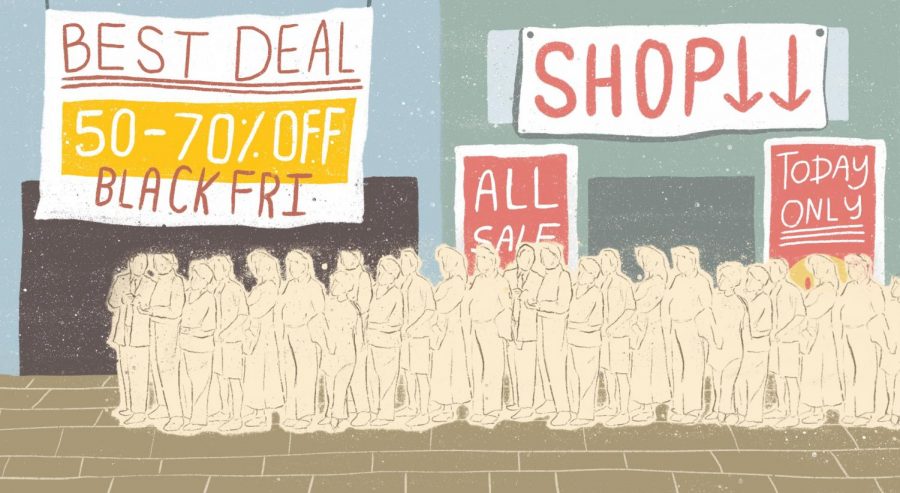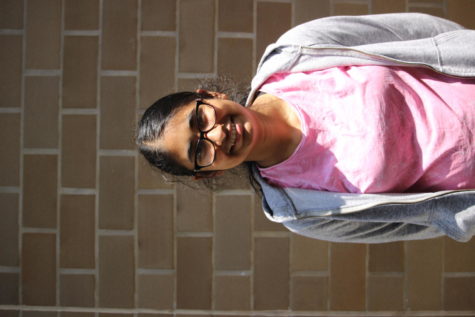The rise of Thanksgiving commercialism
November 25, 2019
From its origins of gathering around the dining table, sharing turkey and other delicious delights, Thanksgiving has become a time where families spend time apart waiting in long lines, eager to buy a new electronic device with a huge discount.
Thanksgiving was initially considered a harvest festival. The very first Thanksgiving was believed to have been celebrated at Plymouth in 1621, lasting three days and attended by both Pilgrims and Native Americans. After celebrating their first harvest in the New World, Thanksgiving wasn’t celebrated by the colonists until the American Revolutionary War.
After the British defeat at the Battle of Saratoga, then-general George Washington proclaimed a Thanksgiving feast as a victory celebration. In 1789, George Washington signed a federal proclamation that established Thanksgiving, but it only became a federal holiday in 1863, during the American Civil War. Abraham Lincoln placed the date of Thanksgiving on the last Thursday of November, where it stayed for many years.
During the Great Depression, then-President Franklin D. Roosevelt had a plan. In order to prevent the economy from declining further, he moved Thanksgiving up one week to extend the holiday season. Many people were angry with this decision, so in 1941, Roosevelt moved it back to its original date, claiming that there were no noticeable effects on the retail industry.
Economics teacher James Snavely said that the original decision was sensible, because “if people had more time to go shop, then of course they would go out and shop more,” which would improve the economy.
Although now Thanksgiving is a time for most people to go Christmas shopping to try and snag deals, throughout American history, Thanksgiving has been a time of togetherness where extended families would get together around their dining tables and give thanks.
People loved Thanksgiving so much, they were enraged when the date was only slightly changed. In recent years, however, with the rise of “Black Friday,” the day after Thanksgiving when people rush to stores to get the best possible deals, the feeling of togetherness has been lost, and Thanksgiving is no longer celebrated the way it used to be.
“People are really focused on getting a bunch of items [on Thanksgiving],” DV alumni Shreenithi Narayanan, a Black Friday fanatic, said. “And some people neglect spending time with their family and friends to do that.”
In the 2000s, many stores would open at early morning hours between 5-6 a.m., but ever since the start of this decade, stores are now opening as early as 5 p.m. on Thanksgiving Day itself (in some states, opening shop on federal holidays is illegal). People are buying into this trend, lining up eagerly outside stores two hours before doors even open. While the impact this has had on the economy is often overlooked, it is actually a considerable amount.
“Because 70 percent of the economy is consumer spending, during the holiday season, when customers are out there spending it is good for the economy, as then the companies are making money, they’re hiring workers, and people get paychecks,” Snavely said. “Most economists argue that the holiday spending is impossible.”
People have even resorted to violence on Thanksgiving in order to cinch the best deal. Stories of shoppers getting trampled routinely make the news during the holiday season, a sharp contrast to the meaning of Thanksgiving: peace and unity.
“I don’t like the consumerist values, especially right after a time of family,” senior Derek Guo said. “These new consumerist behaviors seem to override the original spirit of the holiday season.”
While it is easy to point fingers at who is responsible for the regression of Thanksgiving as a meaningful holiday, the most likely candidate being the owners of “big-box stores”, many managers at these stores feel pressured to provide big discounts near the holiday in order to remain competitive with other businesses.
“I feel like Costco doesn’t need any deals on Black Friday, but if we don’t have any deals, then people wouldn’t come here, so Costco needs deals to stay competitive,” Ramon Perez, Danville Costco store manager, said. “I wish all stores were closed on Thanksgiving so people could spend time with their families.”
Even if some store managers feel pressured to give deals on Black Friday, the general public eats up these deals. Many people feel that this growing trend of consumerism during the holiday season is unlikely to change in the upcoming years.
“Unfortunately, until there’s an economic incentive to go against it, which I don’t really see nowadays, it is unlikely to change,” Guo said, adding that it would most likely get worse in the future, as “Christmas decorations are now utilized as early as Nov. 2.”
Thanksgiving is now associated with waiting in long lines in order to get the best device for the best deal, but it wasn’t always this way. In the modern age, people are more concerned with getting the best deal and less concerned with spending time with their families.
“Black Friday seems to be used as a way to get people to spend a lot of money,” Narayanan said.
However, not all stores have succumbed to the modern trend of having deals as early as 5 p.m. on Thanksgiving Day. Costco is closed on Thanksgiving Day, but they are open on Black Friday with regular store hours.
“All Costco employees get to spend time with their families on Thanksgiving Day,” Perez said.



